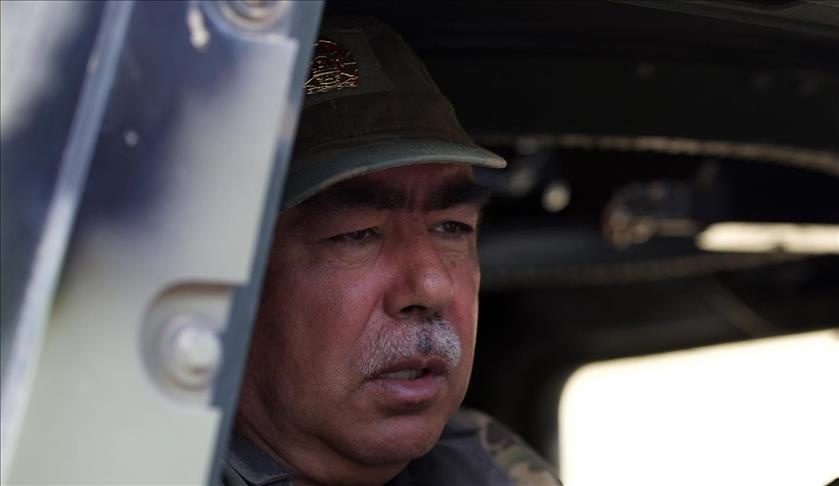Return of vice president sparks anxiety in Afghanistan
Gen. Dostum joins hands with Afghan leaders opposed to President Ghani within days of his return from self-imposed exile

112388
By Shadi Khan Saif
KABUL, Afghanistan
Vice President Gen. Abdul Rasheed Dostum has joined hands with Afghan leaders opposed to President Ashraf Ghani, launching a new front against the government within days of his return from self-imposed exile.
Dostum, who faces charges of war crimes and sexual assaults, returned to Afghanistan’s turbulent political arena on Tuesday, and on Thursday he was flanked by some top government officials who remain critical of Ghani such as Foreign Minister Salahuddin Rabbani, deputy chief executive officer of the National Unity Government, Mohammad Mohaqiq, and Atta Mohammad Noor, the former longstanding governor of Balkh province and chief executive of the Jamiat-e-Islami party, which has been in the government since the fall of the Taliban regime in 2001.
Bashir Teyanj, spokesman for Dostum’s Junbish-e-Milli party, said the new alliance -- Greater National Alliance -- has been formed due to the government’s alleged failures in creating jobs, ensuring security and holding transparent elections besides promoting ethnic rifts.
Kabul-based writer and political commentator, Yonus Fakoor, told Anadolu Agency that Dostum is playing a “double-game”, and may switch to the stronger side once the time is right. “This has been the legacy of Gen. Dostum; he has ditched close friends and made new alliances multiple times in the past.
“Now again, he is practically still a power-sharing vice president, as well as the main party in the anti-government alliance just before the forthcoming parliamentary elections is due in October and presidential elections is due in 2019.”
Fakoor added that warlords-turned politicians in Afghanistan were also anxious about growing contacts between the Taliban and the U.S. amid increasing prospects for resolving the decades-long Afghan conflict.
The 63-year-old Dostum continues to hold significant clout among the country’s ethnic Uzbek community.
Many observers believe pressure by his supporters had forced the Kabul-backed government to allow Dostum’s return to his post despite a case of sexual assault filed against him by his own former party member, Ahmad Ishci.
Earlier this month, pro-Junbish supporters brought the government to a standstill following a weeks’ long protest campaign against the arrest of militia commander Nezamuddin Qaisari associated with Dostum in the northern provinces bordering the Central Asia. All public offices of the civil and security sectors, including the crucial dry ports had remained shut until the government allowed the vice president to return from Turkey.
- Ghani remains quiet
Qaisari had been accused of rape, murders and can also be seen in a viral video threatening to execute security officials.
The Junbish party rejects all allegations made by its opponents. Junbish party spokesman Bahruddin Jawzjani told Anadolu Agency the arrest of Qaisari demonstrates the alleged “fascist” approach of the government towards the Uzbeks.
“Many other individuals who have even fought against the government have been treated well and even hosted at the presidential palace, but commander Qaisari has been victimized,” Jawzjani said.
In his speech during a welcome ceremony, Dostum had called on his supporters to remain calm and end their protests.
“We created this system [of governance] and we will protect it at any cost, but it was also our duty to criticize the weakness of the government in a constructive manner and introduce reforms,” he said.
Ghani has so far kept quiet and instead spoken about other issues such as curbing illegal armed militias, electricity generation and pro-development agendas during his public appearances since the return of Dostum.
One of his advisers, Nabi Misdaq, told Anadolu Agency the government respects freedom of expression and political activities, but those trying to be in two boats at a time must reconsider their positions.
“It is quite a simple affair, one can be either in the government to serve the masses in the best possible way or be in opposition to have constructive criticism of the government, both cannot work together,” Misdaq said.
Meanwhile, ex-Mujahedeen leader Gulbuddin Hekmatyar has also expressed his opposition to the newly-formed alliance, terming it a “momentary move for personal gains”.
Anadolu Agency website contains only a portion of the news stories offered to subscribers in the AA News Broadcasting System (HAS), and in summarized form. Please contact us for subscription options.


